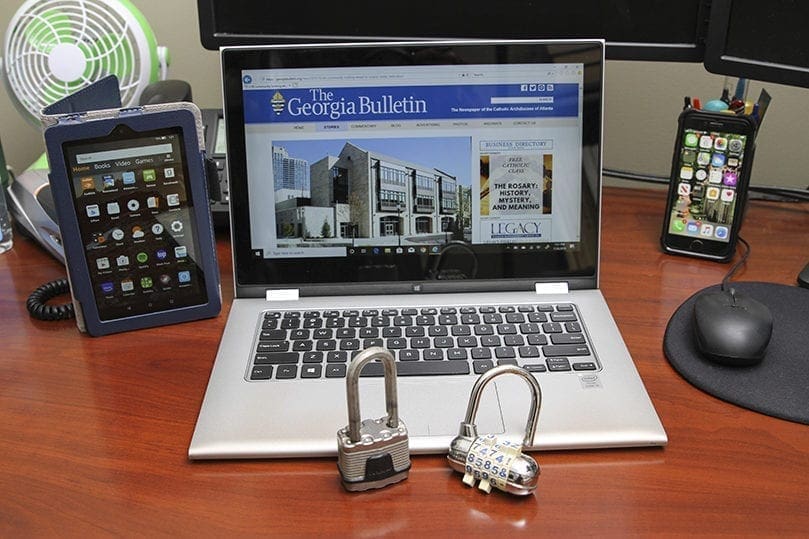 Photo By Michael Alexander
Photo By Michael AlexanderAtlanta
How to practice cybersafety this holiday season
By SAMANTHA SMITH, Staff Writer | Published November 14, 2019
ATLANTA—In 2018, the Archdiocese of Atlanta sent out alerts regarding fraudulent emails circulating to parishioners asking them to send iTunes gift cards.
Hackers posing as pastors via email stated that the gift cards were needed for an emergency. This scam occurred in churches of various denominations.
With support from the Information Technology Office of the Atlanta Archdiocese, many parishes sent alerts as soon as possible to parishioners informing them of the scam and to delete the emails immediately.
Some were quick to catch on to the phishing scam, but other parishioners willingly purchased and sent gift cards.
In October, Georgia’s Attorney General Chris Carr announced the release of “Cybersecurity in Georgia,” a new protection resource for small businesses, nonprofits and houses of worship.
“Cybercrime and identity theft can have a huge impact on businesses and consumers alike—from the compromise of sensitive data to financial exploitation,” said Carr. “Educational awareness is still the greatest protection against cyber threats.”
“Cyber intrusions are becoming more commonplace, more dangerous and more sophisticated,” according to the Federal Bureau of Investigation.
The FBI reports that in 2018, most victims of fraud in Georgia were between the ages of 40-49. Victims older than 60 years of age suffered the greatest financial loss, totaling over $17 million. Most fraud victims in Georgia fell for scams regarding non-payment or non-delivery.
Shopping, an increase in advertising and the busyness of the holiday season makes cybercrime more prominent, explained Tom Hardy, director of Information Technology for the Atlanta Archdiocese.
When people are preoccupied and handling multiple things at once, they can easily click on fraudulent links without thinking, said Hardy. “It can happen to anybody.”
The Office of Information Technology for the Archdiocese of Atlanta provided tips and resources to help consumers stay safe and aware during the holiday season. These tips will not prevent all cybercrime, but can help shoppers stay protected. The suggestions also apply when making charitable contributions online during this season of giving.
Avoid shopping on public Wi-Fi. Avoid online shopping in public places like restaurants, hotel lobbies and libraries. If you must shop or handle private information on public Wi-Fi, install a virtual private network (VPN) app on your laptop. Visit pcmag.com for a list of VPN services.
Do not provide unnecessary information to businesses. To make a purchase, most stores do not need to know your monthly mortgage payment, social security number or bank balances.
Enable private browsing. Use private browsing on a web browser to prevent third parties from tracking your searches for ad use. This is available on most major web browsers, including Internet Explorer (inPrivate), Firefox (Private Browsing) and Google Chrome (Incognito Mode).
Keep your devices updated. Make sure you are downloading the latest updates on your computer and other tech devices. Also, have updated antivirus and malware tools installed. Do online shopping from behind a firewall.
Monitor transactions on bank statements. Check bank statements regularly for accuracy. Be on the lookout for charges from all companies. The Federal Trade Commission provides information for people disputing credit card charges (consumer.ftc.org).
Review your passwords. Use strong passwords that are unique and invest in a password management app. Visit pcmag.com for tips on how to create strong passwords and a list of the best password managers.
Shop on secure sites. Look for the padlock logo and a secure socket layer (https) in the web browser. Visit websites directly versus clicking on a link through a third party, such as a social media platform or an ad on another website. Visit whynohttps.com for a list of websites not redirecting to a secure connection.
Think before you click. When visiting a website of an unknown company, call the business number to verify its legitimacy before making a purchase or sharing private information. When you receive an email that seems suspicious or does not line up with your normal activity, delete it or call the company to verify the request.
Use secure payment methods. Use a payment method with an extra layer of protection, such as Apple Pay, Google Pay or PayPal. Use gift cards when shopping, so scammers will have access to a smaller amount of money if card information is stolen.
Use separate email address for purchases. Do not use a business or personal email address when shopping with unfamiliar stores. Visit proprivacy.com for a list of free private email providers.
“You’re in a constant battle—what’s more convenient and what’s safer,” said Hardy. Our society drives convenient options, but we must consider the risk of those choices, he said. When it comes to being safe online, “it’s about paying attention and being as vigilant as you can.”